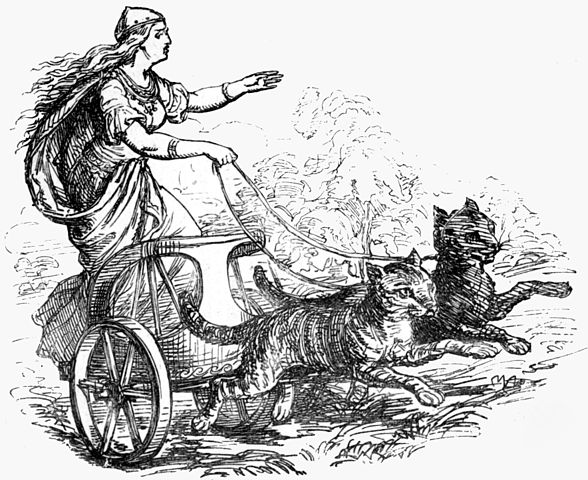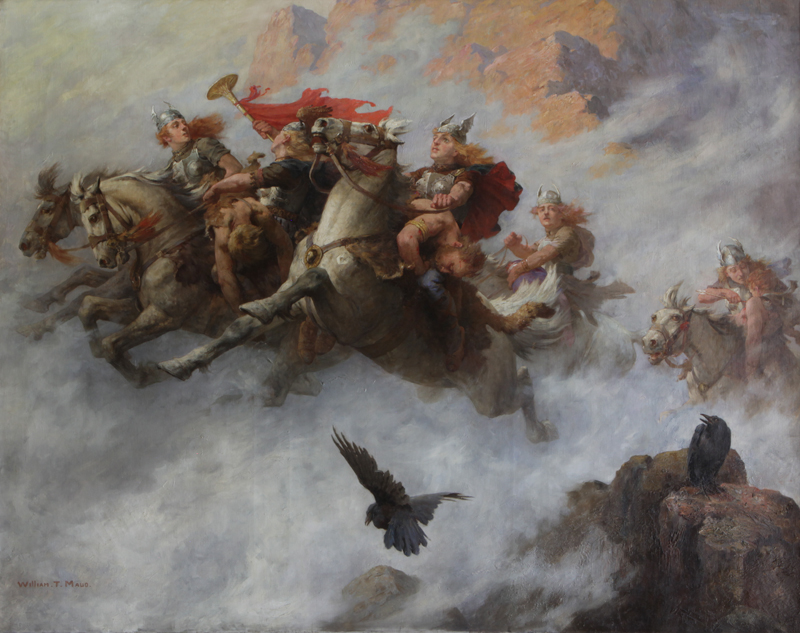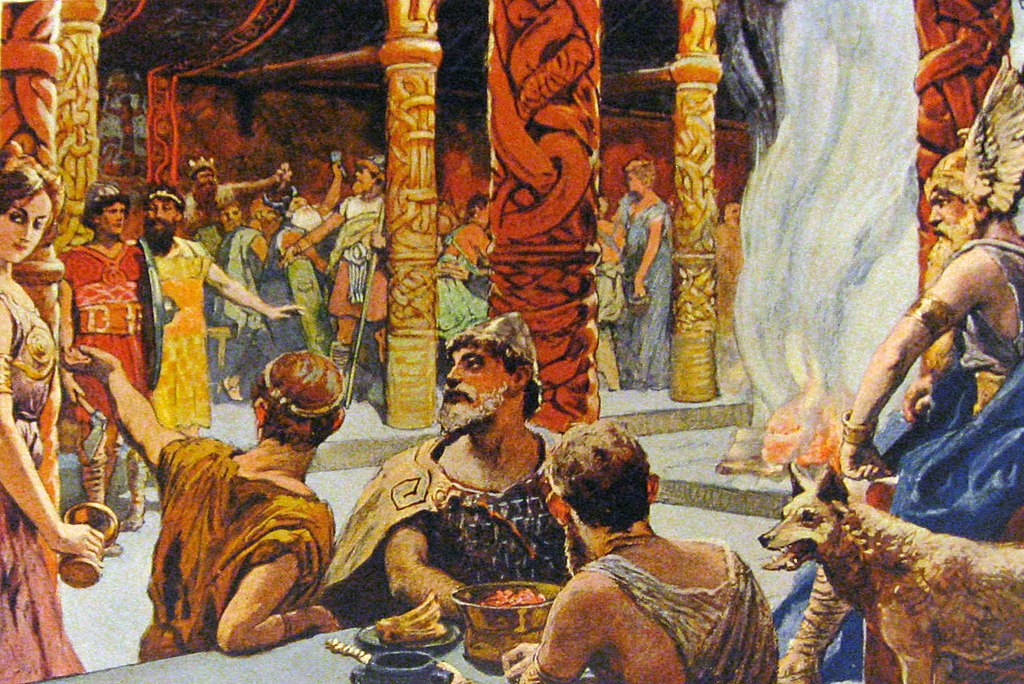Valhalla and Fólkvangr are, for all intents and purposes, the same. Odin and Freyja choose from the fallen warriors, but there is no indication of who gets the first pick. It’s certainly more peaceful in Fólkvangr. Warriors who ended up in Valhalla prepare for Ragnarök every day, although they do have a never-ending supply of wild boar and mead.
In this article, we investigate the reasons the deceased of the Viking age ended up in Valhalla or Fólkvangr.
Valhalla: Where Is It, Who Rules It, and What Happens There?
In Norse mythology, Valhalla is the necropolis of the Einherjar, male warriors who died a noble death in battle. The Valkyries then carried them to Valhalla slung across their horses, where they would feast and prepare to fight for the Æsir as part of Ragnarök. Valhalla is a region within the realm of Asgard.
Ragnarök was a succession of battles and events that preceded the end of the Old Norse world. The final stage was a battle at the fields of Vígríðr that pitched the Norse gods, led by Odin, against demons and giants, ending in the destruction of the gods.

In Valhalla, the Einherjar warriors eat meat from the wild boar Sæhrímnir, which replenishes itself every night and the Valkyries serve them mead from the udder of the goat Heiðrún.
Becoming an Einherjar wasn’t necessarily the preserve of noble warriors. Any criminal, wrongdoer, miscreant, or low life could end up in Valhalla as an Einherjar. It was not how you lived that mattered; it was how you died.
Odin only wanted the bravest Norse warriors to end up in Valhalla, so he would sometimes use the Valkyries to tip the balance of a fight in the inferior fighter’s favor so the more gifted one would die and become an Einheri.
Fólkvangr: Where Is It, Who Rules It, And What Happens There?
Fólkvangr (“people field,” “field of the host,” or “field of warriors” in Old Norse) is the afterlife location of half the Æsir warriors that die in battle (the other half go to Odin at Valhalla). The Vanir goddess Freyja is the guardian and lives in a hall called Sessrúmnir. The goddess Freyja was the daughter of the Vanir Njord and her brother was Freyr.

Fólkvangr was open to men and women. In Egils Saga (Icelandic saga), Egill Skallagrímsson’s daughter, Thorgerd, tells her father she would rather starve to death than live on after her father and brother:
Thorgerd replied, ‘I have had no evening meal, nor will I do so until I join Freyja. I know no better course of action than my father’s. I do not want to live after my father and brother are dead.
The Poet Egil Skallagrimsson and His Poem – Jstor Org
In the poem Grímnismál from the Poetic Edda, Grímnir (Odin in disguise) told Agnar, Frigg’s foster son, the following:
The ninth is Folkvang,
Grímnismál – Germanic Mythology
where Freyja decrees
Who shall have seats in the hall;
The half of the dead each day does she choose,
And half does Othin have.
In chapter 24 of Gylfaginning from the Prose Edda, Hár (Odin in disguise) tells Gangleri (King Gylfi in disguise) that Freyja is: “the most glorious of the ásynjur”; she is the ruler of a hallowed hall called Fólkvangr,” and “whenever she rides to battle she gets half of the slain and the other half Odin.” Hár then describes Freya’s Hall, Sessrúmnir.
Valhalla and Fólkvangr: Differences and Similarities
Valhalla and Fólkvangr are, for all intents and purposes, the same. Odin and Freyja choose from the fallen warriors, but there is no indication of who gets the first pick.
Valhalla is the training ground for warriors to fight in Ragnarök, so it would make sense that the best fighters go there. However, the Valkyries are tied to Odin, the all-father, and they decide who lives and who dies.
How It Is Decided Which Warriors Go To Fólkvangr and Which Go To Valhalla?
It is not clear which warriors go to Fólkvangr and which ones go to Valhalla. The Einherjar reside in Valhalla and train to fight in Ragnarök. It would make sense, therefore, that Odin, or at least the Valkyries, choose the finest fighters.
We know that the Valkyries decide who to take to Valhalla because, in the Volsung Saga, Odin condemns Brynhildr to marrying a mortal because she disobeys him when she kills a king instead of allowing him to win in battle.

Chapter 24 of Gylfaginning, the first part of the Prose Edda by the Icelandic poet and writer Snorri Sturluson, states:
Fólkvangr’t is called, | where Freyja rules
Gylfaginning – Voluspa Org
Degrees of seats in the hall;
Half the kill | she keepeth each day,
And half Odin hath.
Further evidence that the Valkyries choose from among the dead appears in The Lay of Hákon (Hákonarmól) by Eyvind Finnsson Skáldaspillir:
Gautatýr (another alias of Odin) sent forth Gondul and Skogul [both Valkyries]
The Lay of Hákon – Sacred Texts
to choose among kings’ kinsmen:
who of Yngvi’s offspring should with Óthin dwell,
and wend with him to Valholl.
However, there are occasions when Odin commands them to fetch a worthy warrior to the “hall of the slain,” in this case, King Haakon The Good:
‘Go, my Valkyries,’ Odin said,
Hakonarmal – Odins Gift
‘Go forth, my angels of the dead,
‘Gondul and Skogul, to the plain
Drenched with the battle’s bloody rain,
And to the dying Hakon tell,
Here in Valhal shall he dwell.
And Valhalla is mentioned in a later passage but not Fólkvangr:
Sate (dying) then the liege-lords with swords brandished,
The Lay of Hákon – Sacred Texts
with shields shattered and shredded byrnies:
not happy in their hearts was that host of men,
and to Valholl wended their way.
Is It Better To Go To Valhalla or Fólkvangr?
It’s certainly more peaceful in Fólkvangr. Warriors who ended up in Valhalla prepare for Ragnarök every day, although they do have a never-ending supply of wild boar and mead.
Fólkvangr is a meadow or field, so presumably, a pleasant environment, while Valhalla is a series of great halls and a battle training ground.

